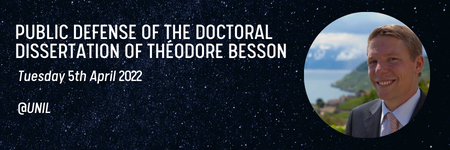Public defense of the doctoral dissertation of Théodore Besson !

The UNIL has the honour of inviting you to attend the public
defense of the doctoral dissertation of
Théodore Besson
Title of the doctoral dissertation:
Artificial Closed Ecosystems, Life Support Systems and Industrial Ecology.
Synergies of terrestrial and space R&D as drivers for implementing sustainability.
The public defense will take place on Tuesday the 5th of April 2022 at 16:00 at UNIL (Anthropole, room 2097) or via live-stream (link).
Abstract of the doctoral research
This PhD thesis focuses on the convergence of two main research domains – industrial ecology (IE) and life support systems (LSS) –, a convergence that is further examined in the context of development of artificial closed ecosystems (ACE). An ACE is a simplified and miniaturised ecosystem operating in closed-loop. It uses biological organisms (bacteria, microalgae, plants, animals, etc.) to regenerate air, water and food with the objective of complete self-sufficiency. An ACE replicates and shortens some of Earth’s biogeochemical cycles and accelerates nutrient and resource recycling loops that occur in the terrestrial environment. In this research, integrated LSS are considered as ‘crewed’ ACE – that is ACE with humans – designed to ensure health, safety and minimal comfort in extreme environments so that humans can survive in autonomy in confined and isolated habitats over prolonged periods of time. The succession of LSS compartments (e.g. bioreactors, plant growth chambers) are combined to meet the human needs and achieve an uninterrupted conversion and regeneration of organic wastes such as exhaled carbon dioxide, urine, feces and non-edible parts of plants into breathable atmosphere, potable water and edible biomass. Advanced LSS or space ACE are required for long-term manned space missions or habitations, when terrestrial resupply is logistically not possible or too costly. Space ACE are designed to ensure the required environment for humans to sustain life in outer space habitats over prolonged periods of time.
The first part of this thesis attempts to clarify the potential, relevance and interest of ACE research in order to consolidate the conceptual foundations of IE. Key concepts for ACE analysis in the perspective of IE are proposed, concepts that encompass interactions on artificially predefined symbioses in circular systems, as well as cycling, biodiversity, compartmentalisation, reproduction and evolution. By leveraging the study of integral recycling loops in the context of an expanding society and a world of finite resources, ACE are considered as relevant tools for the maturation of industrial ecosystems. When operating under the radical conditions of the space context, a space ACE can be envisioned as a model of industrial ecosystems under extreme constraints. All in all, this study demonstrates that ACE development represents an excellent compromise and has an untapped potential for developing further the theoretical basis of IE.
The second part focuses on the possible ways to cross-fertilise the terrestrial and space dimensions of LSS development. The performed research covers the conceptualisation of R&D synergies within the Oïkosmos programme and the exploitation of an ACE ground demonstrator as a technology platform for the study of ACE. It shows how such full-scale crewed demonstrator for preparing manned planetary exploration in the most realistic conditions can leverage and intensify LSS development by providing research synergies at the interface of its terrestrial and space dimensions. In particular, this thesis provides various case studies related to European Space Agency’s MELiSSA project on circular systems, as well as to the Swiss-based start-up Earth Space Technical Ecosystem Enterprises SA which develops ACE-related components, prototypes and applications.
The third part of this work tackles the contributions of ACE development to the operationalisation of IE. This dissertation analyses the potential of ACE development for the technological empowerment of self-sufficient habitat on Earth and for the implementation of terrestrial sustainability. The examined Earth-based applications of ACE include decentralised waste valorisation and resource recovery combined to on-site food production, measurement of exposures (including food, drugs, micropollutants, etc.) and analysis of their effects on the health and on the environment, e.g. indoor air quality control (biological and chemical risks), at-home health monitoring and remote assistance, and maintaining of the quality of life and well-being of habitat occupants. In the context of the emergence of New Space, this thesis also highlights that the next frontier for sustainability is space and considers the possible ways to envisage sustainability (in the human life perspective) at cosmic scale.
ACE and LSS are eye-openers to the benefits of bioinspiration. They open up new avenues for the control and regulation of ecosystems leading to new facets of interpreting nature and the improvement of health in general within a closed habitat. It can be deduced from this work that the realisation of the promises of ACE development will depend on an open and constructive dialogue between medicine, biology, humanities and environmental sciences, enabled by engineering and digitalisation capacities.
Even if manned long-duration and remote space missions would not be carried out, research for hyper-efficient space ACE is worth doing anyway not only due to the growing constraints on Earth, but to their potential for the sustainable resource management on Earth. Therefore, this research anticipates that ACE components will be developed in any case for their relevance for terrestrial sustainability, and their market applicability into everyday life.
As evidenced by this thesis, research on ACE and LSS is an excellent instrument to forge a sustainable future, by elaborating more closed industrial ecosystems, more sustainable in the face of decreasing supplies of raw materials and increasing problems of waste and pollution. Therefore, synergies of terrestrial and space R&D on ACE and LSS can act as drivers for implementing sustainability, in the perspective of IE.
Brief Curriculum Vitae